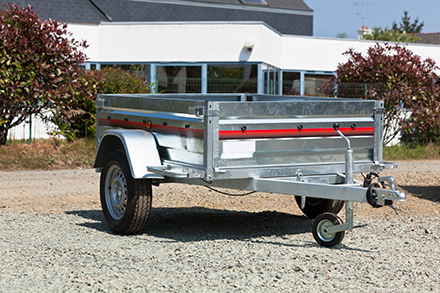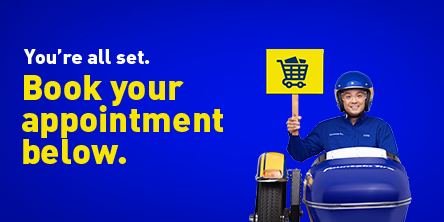Trailer Tires

Tips for Hauling a Trailer
Pick the right equipment for the job. This includes a vehicle with the appropriate towing capacity, the right type and size of trailer hitch, functioning trailer lights and of course, the right tires. It is best to reference your owner’s manual for the vehicle’s maximum towing capacity and gross combined weight rating (GCWR). This refers to the total amount of weight allowed for your entire setup, including vehicle, occupants, and cargo, in addition to the load on the trailer and the trailer itself.
Trailer inspection. To avoid having to ditch your trailer because of a flat tire or seized wheel bearing, we recommend getting your trailer inspected by a company that sells and maintains trailers.
Secure your load. Pulling a trailer without properly securing the load is illegal and dangerous. We recommend double checking the cover, straps, and/or fasteners that are securing your load.
Use a spotter. When backing up with a trailer, it is always a good idea to have someone you trust as a spotter to help avoid hitting anything or anyone. Make sure your spotter is positioned so you can see and hear them.
Take your time. The added weight of the trailer will slow your acceleration, make turns more difficult, and increase your braking distance. It's important to account for these changes while pulling a trailer.
Trailer Tire FAQs
Unlike tires on your car, trailer tires have strengthened sidewalls to handle the weight of the trailerload, especially when rounding corners.
You can tell if a tire is made especially for trailer use if it has “ST” or “Trailer use only” written on the sidewall of the tire.
Check your tire pressure regularly to ensure you are maintaining the recommended pressure for your trailer tires. Underinflated tires cause your tires to be overworked, which can be unsafe or cause damage. Overinflated tires cause greater tread wear and loss of traction. Air pressure increases with heat, so be sure to measure it before driving, while the tires are still cold.
When storing your trailer, there's a few things you can do to help keep your tires in good condition while you wait to hit the road again. First off, we suggest you keep your tires out of the sun to avoid damage from UV rays. If you can't put it in a garage, tire covers are the best way to provide protection. You should park your trailer on a level surface, and if possible move your trailer occasionally so that the weight of the vehicle isn't putting pressure on the same part of your tire for an extended period of time. To keep weight at a minimum, make sure your unload any excess items from inside the trailer itself. Avoid leaving the tires in direct long-term contact with hot surfaces like asphalt by putting a barrier under them, or using blocks to minimize contact.
For more advice on how to keep your tires in tip top shape, contact your local Fountain Tire.
Whether you're getting a quote online or calling one of our stores, you will need to know the width, ratio, and rim size for the trailer tire. These specifications can be found on the sidewall of your tire. For example, if your tire sidewall read ST175/80R13, the width is 175mm, the ratio is 80% and the rim diameter is 13". Sometimes older tires will have letter sizing like A78-13; if this is the case, please contact your nearest fountain tire store.
*Include an image of a tire sidewall that includes the tire size.
{{showWheelsRims ? 'SEASONAL TIRE CHANGE' : 'NEW TIRE INSTALLATION'}}

Are your tires on wheels/rims? *
Required FieldWill you be storing your tires with us? *
Required FieldAre your tires already stored at the {{branch.branchName}} store? *
Required FieldAdditional Comment

SLOW LEAK AND/OR FLAT REPAIR

Which tire is losing air or flat?
 Front
Front




{{getSelectedTires()}}
Booking In Process

You currently have an appointment booking in process. If you make changes to your cart now your booking will be cancelled.
Booking Cart Cleared
As our products and servicess vary by store, we have cleared your booking cart. Please re-select the items for your appointment.
You need to select a store in order to obtain an accurate quote
Oops!
Something happened, please try again..No Locations Found
Please try your search again.
{{location.branchName}}
{{location.address}} {{location.city}}, {{location.province}}, {{location.postalCode}}
(Mobile Truck)
Thank you for requesting a quote.
{{branch.fullAddress}}
You need to select a store in order to obtain an accurate quote
Oops!
Something happened, please try again..No Locations Found
Please try your search again.
{{location.branchName}}
{{location.address}} {{location.city}}, {{location.province}}, {{location.postalCode}}
(Mobile Truck)
Thank you for requesting a quote.
{{branch.fullAddress}}
A set of tires is currently in your cart. Would you like to replace it?



A set of wheels is currently in your cart. Would you like to replace it?

Please Confirm Your Vehicle Details
Vehicle and Product Mismatch

The tires selected {{validationResult.tireSize}} do not match the manufacturer’s recommendation.
You can contact the store if you are unsure if the selected tire size is the right fit for your vehicle.
The wheels selected, {{validationResult.wheelSize}}, does not match per the vehicle manufacturer recommendation.
Putting on incorrect wheel size can be a real safety hazard or result in damaging the vehicle. It is recommended to put on wheels that matches the vehicle manufacturer.
You can contact the store, if you are unsure if the selected wheel size is the right fit for your vehicle.
The tires selected, {{validationResult.tireSize}}, and wheels selected, {{validationResult.wheelSize}}, do not match per the vehicle manufacturer recommendation.
Putting on incorrect tire/wheel size can be a real safety hazard or result in damaging the vehicle. It is recommended to put on tires/wheels that matches the vehicle manufacturer.
You can contact the store, if you are unsure if the selected wheel size is the right fit for your vehicle.




